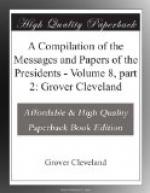It seems to be often overlooked that a national constitution has been adopted in this country, establishing a real government therein, operating upon persons and territory and things, and which, moreover, is, or should be, as dear to every American citizen as his State government is. Whenever the true conception of the nature of this Government is once conceded, no real difficulty will arise in the just interpretation of its powers; but if we allow ourselves to regard it as a hostile organization, opposed to the proper sovereignty and dignity of the State governments, we shall continue to be vexed with difficulties as to its jurisdiction and authority. No greater jealousy is required to be exercised toward this Government in reference to the preservation of our liberties than is proper to be exercised toward the State governments. Its powers are limited in number and clearly defined, and its action within the scope of those powers is restrained by a sufficiently rigid bill of rights for the protection of its citizens from oppression. The true interests of the people of this country require that both the National and State Governments should be allowed, without jealous interference on either side, to exercise all the powers which respectively belong to them according to a fair and practical construction of the Constitution. State rights and the rights of the United States should be equally respected. Both are essential to the preservation of our liberties and the perpetuity of our institutions. But in endeavoring to vindicate the one we should not allow our zeal to nullify or impair the other. * * *
The true doctrine, as we conceive, is this, that while the States are really sovereign as to all matters which have not been granted to the jurisdiction and control of the United States, the Constitution and constitutional laws of the latter are, as we have already said, the supreme law of the land, and when they conflict with the laws of the States they are of paramount authority and obligation. This is the fundamental principle on which the authority of the Constitution is based, and unless it be conceded in practice as well as theory the fabric of our institutions, as it was contemplated by its founders, can not stand. The questions involved have respect not more to the autonomy and existence of the States than to the continued existence of the United States as a government to which every American citizen may look for security and protection in every part of the land. * * *
Why do we have marshals at all if they can not physically lay their hands on persons and things in the performance of their proper duties? What functions can they perform if they can not use force? In executing the process of the courts must they call on the nearest constable for protection? Must they rely on him to use the requisite compulsion and to keep the peace while they are soliciting and entreating the parties and bystanders to allow




